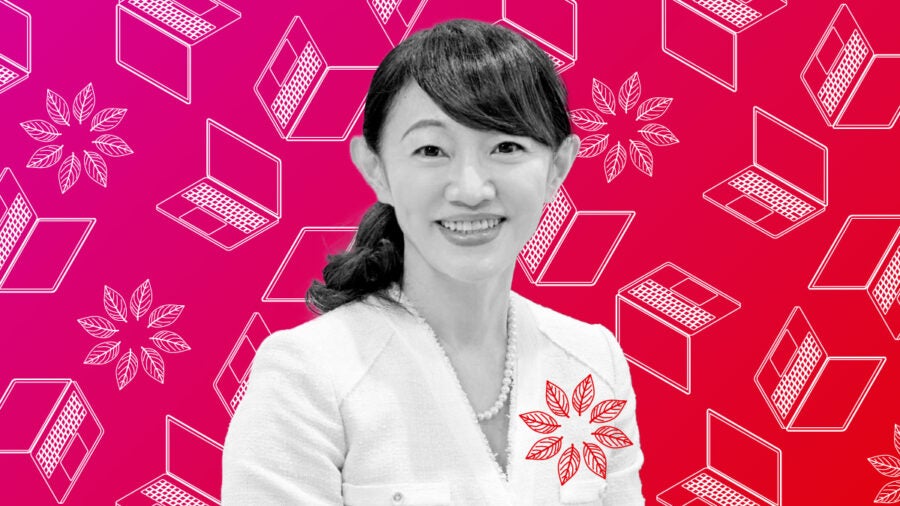
When Taeko Yamamoto joined Fujitsu, as its global CMO four years ago, the Japanese IT firm was on the cusp of an overhaul.
“The new CEO – who was appointed one year before me – really wanted to transform Fujitsu from a product company to a services company,” she says. In Yamamoto, he found a perfect ally. She came to Fujitsu after seven years at Microsoft, which was in the process of moving from desktop software to cloud computing and developing its AI Copilot. Before that, she had been at IBM for 11 years as the US tech company was moving away from producing hardware and towards becoming a business consulting service.
“I was in the middle of a transformation at two companies,” Yamamoto explains.
Japanese heritage, global vision
Fujitsu is one of the oldest IT companies in the world. Established in 1935, it manufactured Japan’s first computer and is the world’s sixth-largest IT services provider. But it’s the firm’s Japanese heritage that really appealed to Yamamoto. “I’m Japanese, so I really want Japan to be active again,” she says. “Twenty years ago, Japanese brands – like Toshiba and Canon – were right up there. I really wanted to contribute to a Japanese company.”
Despite being a multinational organisation, Fujitsu retains the Japanese culture it was built upon, Yamamoto says. She explains that Japanese people are very punctual, humble and shy and these qualities are embedded in the organisation. “Even though we have great technology and industry knowledge, we don’t show it off.”
Balancing marketing with humility
Humility and marketing are rare bedfellows. The marketing function relies on the ability to shout about the merits of a product or service and explain why it is better than its competitors. So how does Yamamoto square this?
“I’m trying my best,” she laughs. “But that humility is unique to Fujitsu, so I don’t think we need to change. We have to be as we are but we’re experimenting with more aggressive marketing tactics and using digital channels to distribute messages more widely. I push my team to be brave, but we don’t need to be outspoken. The quality will speak for itself.”
Earlier this year, the firm’s Cannes Lions entry, which showcased its digital twin technology, was shortlisted for a Design Lion. The tool creates digital twins of cities so that solutions to certain social and environmental problems can be tested.
How to unify a global marketing division
When starting in the CMO role, Yamamoto’s first task was uniting Fujitsu’s marketing function. The organisation has operations in more than 35 countries, which brings considerable challenges when it comes to alignment.
“Each region operated independently before I joined,” Yamamoto says. “But our CEO wanted them integrated.” To do this, Yamamoto instructed the marketing team at the company’s headquarters to set the core strategy but the message would be tailored for each region. “We create the marketing message but we listen to the voices of customers in each country and customise based on that,” she adds.
Yamamoto also consolidated and standardised the marketing tech stack and encouraged Fujitsu’s marketers to spend more time talking to customers and using data to make decisions.
“Gradually, people started to become one team,” she says. “It took four years and there were challenges but people really wanted change. They wanted Fujitsu to be a strong company, so I didn’t see any pushback.”
Using culture to drive transformation
Yamamoto largely credits the lack of pushback to Fujitsu’s culture. Its workforce is highly diverse – something Yamamoto says she actively encourages. “Our team is 45% female and comes from many different nationalities and cultures,” she says, explaining that she has also made a push to hire more gen-Z talent. “Constant discussion, brainstorming and communication – these are key to becoming one team,” she says.
This collaborative spirit is aided by the firm’s Japanese culture, she says, which is primarily one of warmth and community. Warmth is also central to Fujitsu’s transformation plans. “Sustainability shouldn’t be cold,” Yamamoto says, although she acknowledges that cutting-edge technology firms, particularly those working in the AI space, can often be seen as clinical at best, unethical at worst. “We need warm hearts and emotions to become a sustainability-transformation company.” Warmth, humility, collaboration – values at odds with how many might view global business, but perhaps, for this new chapter for Fujitsu, that is precisely the point.
Three lessons for global marketers
Even when you’re operating on a global scale, the mores and attitudes of your founding country can be a rich vein of cultural identity. Rather than fighting to incorporate the national characters of every country in which you operate, use your heritage as the foundation upon which to build your brand.
To create a unified message, you need to centralise. Having a global marketing leader who can set the strategy for the organisation as a whole is vital. It is, however, equally important to tailor the strategy to each region to ensure it resonates with a local audience.
Operating in many different countries bakes diversity into the organisation automatically, so make the most of it. Ensure you create an inclusive environment where everyone can have a voice and contribute to discussions. This is where the best ideas come from.

When Taeko Yamamoto joined Fujitsu, as its global CMO four years ago, the Japanese IT firm was on the cusp of an overhaul.
“The new CEO – who was appointed one year before me – really wanted to transform Fujitsu from a product company to a services company,” she says. In Yamamoto, he found a perfect ally. She came to Fujitsu after seven years at Microsoft, which was in the process of moving from desktop software to cloud computing and developing its AI Copilot. Before that, she had been at IBM for 11 years as the US tech company was moving away from producing hardware and towards becoming a business consulting service.
“I was in the middle of a transformation at two companies,” Yamamoto explains.





